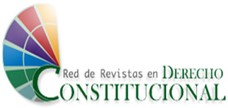RECALL AND THE HÄBERLIAN CONCEPTS OF CONSTITUTIONAL HERMENEUTICS AND CONSTITUTIONAL INTERPRETS
Keywords:
Judicial Recall, Constitutional Hermeneutics, Open society of interpreters of the Constitution, Constitution and Culture, Peter HäberleAbstract
This paper, discusses from a interpretation idea where its inquired about the participants of the interpretive process, presents the figure of the judicial recall as a mechanism that allows an increasing and more effective society participation, because its one of the instruments that translates häberle's the concept of the citizen as an interpreter of the Constitution. Thus, concepts as the normative force of the Constitution and the emergence of constitutional jurisdiction are studied, as well as the constitutional hermeneutics from the perspective of Peter Häberle, from his theses of constitution as culture and open society of interpreters of the Constitution. Considerations are made regarding the recall and judicial recall, the latter as a concrete example of the flexibilization of the legal constitutional interpretation, addressing the issues of judicial activism and open constitutional interpretation. To achieve the desideratum proposed, the method was used the inductive procedure by indirect research technique, dividing the work into six sections, including introduction and conclusion.
References
ARENA, Gregório. A administração condivisa. In: LEAL, Rogério Gesta (Org.). A administração pública compartida no Brasil e na Itália: reflexões preliminares. Santa Cruz do Sul: EDUNISC, 2008. (Série Direito e Sociedade Contemporânea).
BARROSO, Luís Roberto. O direito constitucional e a efetividade de suas normas: limites e possibilidades da constituição brasileira. 5. ed., ampl. e atual. Rio de Janeiro: Renovar, 2001.
BÖCKENFÖRDE, Ernst-Wolfgang. Estúdios sobre el estado de derecho y la democracia. Madrid: Trotta, 2000,
CITTADINO, Gisele. Judicialização da política, constitucionalismo democrático e separação de poderes. In: VIANNA, Luiz Werneck. A democracia e os três poderes no Brasil. Belo Horizonte: UFMG, IUPERJ/FAPERJ, 2002.
DALLARI, Dalmo de Abreu. Elementos da teoria geral do estado. 28. ed. São Paulo: Saraiva, 2009.
HÄBERLE, Peter. Hermenêutica constitucional: a sociedade aberta dos intérpretes da constituição: contribuição para a interpretação pluralista e “procedimental” da constituição. Tradução de Gilmar Ferreira Mendes. Porto Alegre: Sergio Antonio Fabris, 2007.
HÄBERLE, Peter. Teoria de la constitución como ciencia de la cultura. Traducción introducción de Emilio Mikunda. Madrid: Tecnos, 2000.
LEAL, Mônia Clarissa Hennig. Jurisdição Constitucional Aberta: reflexões sobre a legitimidade e os limites da jurisdição constitucional na ordem democrática. Rio de Janeiro: Lumen Juris, 2007.
LEAL, Rogério Gesta (Org.). Administração pública e participação social na América Latina. Santa Cruz do Sul: Edunisc, 2005.
LEAL, Rogério Gesta (Org.). A administração pública compartida no Brasil e na Itália: reflexões preliminares. Santa Cruz do Sul: Edunisc, 2008.
MALUF, Sahid. Teoria geral do estado. 26. ed., atual. pelo Prof. Miguel Alfredo Malufe Neto. São Paulo: Saraiva, 2003.
MARTOS, José A. Montilla. Minoria política & tribunal constitucional. Apud. LEAL, Mônia Clarissa Hennig. Jurisdição constitucional aberta: reflexões sobre a legitimidade e os limites da jurisdição constitucional na ordem democrática: uma abordagem a partir das teorias constitucionais alemã e norte-americada. Rio de Janeiro: Lumen Juris, 2007.
SARMENTO, Daniel. Direitos fundamentais e relações privadas. Rio de Janeiro: Lumen Juris, 2004.








